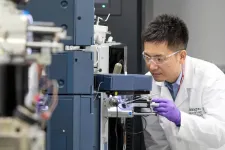(Press-News.org) Researchers have developed new AI models that can vastly improve accuracy and discovery within protein science. Potentially, the models will assist the medical sciences in overcoming present challenges within, e.g. personalised medicine, drug discovery, and diagnostics.
In the wake of broadly available AI tools, most technical and natural sciences fields are advancing rapidly. This is particularly true in biotechnology, where AI models power breakthroughs in drug discovery, precision medicine, gene editing, food security, and many other research areas.
One sub-field is proteomics – the study of proteins on a large scale – where vast amounts of protein data are gathered in databases against which a sample can be compared. These databases enable scientists to discern which proteins – and, thereby, microorganisms - are present in a sample. They allow a doctor to diagnose diseases, monitor the effectiveness of a treatment, or identify pathogens present in a patient’s sample.
Although these tools are very useful and effective, there are limits to what they can do, says Timothy Patrick Jenkins, an Associate Professor at DTU Bioengineering and corresponding author:
“First off, no database includes everything, so you need to know which databases are relevant to your particular needs. Then deep searches are very time-consuming and demand a lot of computer power. And, finally, it’s nearly impossible to identify proteins that haven’t been registered yet.”
For this reason, some groups have worked on so-called ‘de novo sequencing algorithms’ that improve accuracy and lower computational costs with increasing database size. Still, according to Jenkins and colleagues from DTU, Delft University in the Netherlands and the British AI company InstaDeep, their performance remained “underwhelming.”
Exceeding state-of-the-art
In a new paper in Nature Machine Intelligence, they propose two novel AI models to assist researchers, medical practitioners, and commercial entities in finding exactly the necessary information in the vast amounts of data. These are called InstaNovo and InstaNovo+ and are available to researchers through the InstaDeep website (see fact box).
“Seen together, our models exceed state-of-the-art and are significantly more precise than currently available tools. Furthermore, as we show in the paper, our models are not specific to a particular research area. Instead, these tools could propel significant advances in all fields involving proteomics,” says Kevin Michael Eloff, a research engineer at InstaDeep and co-first author of the paper.
To assess the usefulness of their models, the researchers have trained and tested them on several specific tasks within major areas of interest.
One investigation was performed on wound fluid from venous leg ulcer patients. Since venous leg ulcers are notoriously difficult to treat and often become chronic, knowing which microorganisms like bacteria are present is crucial to treatment. The models could map ten times as many sequences as a database search, among them E. coli and Pseudomonas aeruginosa – the latter being a multidrug-resistant bacterium.
Another use case was conducted on small pieces of protein, called peptides, displayed on the surface of cells. These help the immune system recognize infections and diseases such as cancer. The InstaNovo models identified thousands of new peptides that were not found using traditional methods. In personalised cancer treatments empowering the immune system – immunotherapy for short - these peptides are all potential attack points.
“In combination, our tests of the model on complex cases, where, for example, unknown proteins are present, or where we have no prior knowledge of the organisms involved, show that they are suitable to improve our understanding significantly. That this bodes well for biomedicine is a given, since it can directly improve identification of our microbiome, as well as improve our efforts within personalised medicine and cancer immunology,” says Konstantinos Kalogeropoulos, co-first author and Assistant Professor at DTU Bioengineering.
The paper provides six additional cases that demonstrate how these models improve therapeutic sequencing, discover novel peptides, detect unreported organisms, and significantly enhance proteomics searches. The implications of their results extend far beyond the medical sciences, says Timothy Patrick Jenkins:
“Looking at it from a purely technical, scientific perspective, it is also true that with these tools, we can improve our understanding of the biological world as a whole, not only in terms of healthcare but also in industry and academia. Within every field using proteomics - be it plant science, veterinary science, industrial biotech, environmental monitoring, or archaeology - we can gain insights into protein landscapes that have been inaccessible until now.”
FACTS
What Are InstaNovo and InstaNovo+?
InstaNovo is a transformer-based model designed for de novo peptide sequencing. Developed in collaboration between InstaDeep and the Department of Biotechnology and Biomedicine at the Technical University of Denmark (DTU), it translates fragment ion peaks from mass spectrometry data into peptide sequences with unprecedented precision.
Unlike traditional methods that rely on pre-existing databases, InstaNovo identifies peptides that have never been documented before—expanding the landscape of proteomic discovery.
A key innovation of the InstaNovo models is InstaNovo+, a diffusion-based iterative refinement model that enhances sequence accuracy by mimicking how researchers manually refine peptide predictions. InstaNovo+ begins with an initial sequence—either derived from InstaNovo or generated at random—and improves it, step by step.
When paired with InstaNovo, InstaNovo+ significantly reduces false discovery rates (FDR) and improves sequence accuracy, not just by refining predictions, but by exploring a broader range of potential peptide sequences.
Unlike autoregressive models such as InstaNovo and others, which predict peptide sequences one amino acid at a time, InstaNovo+ processes entire sequences holistically, enabling greater accuracy and higher detection rates.
Together, InstaNovo and InstaNovo+ enhance de novo peptide sequencing, striking a balance between precision and exploration to accelerate biological discovery.
Source: InstaDeep.
END
New AI models possible game-changers within protein science and healthcare
New AI models can vastly improve accuracy and discovery within protein science. Potentially, the models will assist the medical sciences in overcoming present challenges within, e.g. personalised medicine, drug discovery, and diagnostics.
2025-03-31
ELSE PRESS RELEASES FROM THIS DATE:
Highly accurate blood test diagnoses Alzheimer’s disease, measures extent of dementia
2025-03-31
A newly developed blood test for Alzheimer’s disease not only aids in the diagnosis of the neurodegenerative condition but also indicates how far it has progressed, according to a study by researchers at Washington University School of Medicine in St. Louis and Lund University in Sweden.
Several blood tests for Alzheimer’s disease are already clinically available, including two based on technology licensed from WashU. Such tests help doctors diagnose the disease in people with cognitive symptoms, but do not indicate the ...
Mind the seismic gap: Understanding earthquake types in Guerrero, Mexico
2025-03-31
Plate temperature and water release can explain the occurrence of different types of earthquakes in Guerrera, Mexico. The Kobe University simulation study also showed that the shape of the Cocos Plate is responsible for a gap where earthquakes haven’t occurred for more than a century. The results are important for accurate earthquake prediction models in the region.
Where one tectonic plate is pushed down by another, the resulting stress is released in various tectonic events. There are catastrophic megathrust earthquakes, unnoticeable “slow slip events,” and continuous low-frequency “tectonic tremors,” and knowing ...
One hour’s screen use after going to bed increases your risk of insomnia by 59%, scientists find
2025-03-31
Scientists have found another reason to put the phone down: a survey of 45,202 young adults in Norway has discovered that using a screen in bed drives up your risk of insomnia up by 59% and cuts your sleep time by 24 minutes. However, social media was not found to be more disruptive than other screen activities.
“The type of screen activity does not appear to matter as much as the overall time spent using screens in bed,” said Dr Gunnhild Johnsen Hjetland of the Norwegian Institute of Public Health, ...
Canada needs to support health research at home and abroad
2025-03-31
In the face of major changes to federal policy and funding in the United States, Canada should support Canadian researchers with adequate funding to ensure long-term research in health and science, argue authors in two articles published in CMAJ (Canadian Medical Association Journal).
“As the US stands on the brink of tearing down its exemplary system for covering the full costs of research, Canada, with its flawed federal system for indirect costs, should heed the recent commissioned science policy report and a chorus of advocacy calling for an enhanced indirect cost system,” writes Dr. William Ghali, vice-president ...
Cannabis use disorder among insured pregnant women in the US between 2015-2020
2025-03-31
Cannabis use has been increasing during pregnancy, according to researchers at Columbia University Mailman School of Public Health and the Columbia University Irving Medical Center. Previous research has observed that past-month cannabis use has more than tripled among pregnant women in the U.S. from 2002-2020 with self-reported cannabis use rising from 1.5 percent to 5.4 percent over the 18 years of tracking data. The findings are published in the American Journal of Preventive Medicine.
Medical guidelines recommend that pregnant women abstain from cannabis because of its link to an increased risk of adverse maternal ...
Education system needs overhaul to support school anxiety, psychologists say
2025-03-30
The UK education system must urgently change to be more understanding of school ‘refusers’, as returning to school might not be the right outcome for some children, psychologists say.
While much has been made of school attendance figures in recent months, a group of experts are suggesting not enough attention has been given to the experiences of parents and young people experiencing school distress.
In a new book, What Can We Do When School’s Not Working?, a parent and two ...
Play “humanizes” pediatric care and should be key feature of a child-friendly NHS – report
2025-03-30
Play should be a core feature of children’s healthcare in forthcoming plans for the future of the NHS, according to a new report which argues that play “humanises” the experiences of child patients.
The report, by University of Cambridge academics for the charity Starlight, calls for play, games and playful approaches to be integrated into a ‘holistic’ model of children’s healthcare – one that acknowledges the emotional and psychological dimensions of good health, ...
Stricter oversight needed as financial misconduct drives risk-taking in banking
2025-03-30
Banks facing regulatory sanctions for financial misconduct tend to adopt riskier business practices, according to new research.
The authors warn repeated or systemic misconduct can accelerate risk-taking in ways that weaken both individual institutions and the wider financial system.
Researchers from the University of East Anglia (UEA), the US Department of the Treasury and Bangor University, in the UK, drew on data from nearly 1,000 publicly listed US banks from 1998 to 2023 - a period spanning multiple economic cycles including the 2007–09 ...
Cardiac arrest during long-distance running races
2025-03-30
About The Study: This study found that despite increased participation in U.S. long distance running races, the incidence of cardiac arrest during U.S. marathons and half-marathons remains stable. There has been a marked decline in cardiac arrest mortality, and coronary artery disease was the most common etiology among cases with sufficient cause-related data. Effective emergency action planning with immediate access to defibrillation may explain the improvement in survival.
Corresponding Authors: To ...
Preventable cardiac deaths during marathons are down, Emory study finds
2025-03-30
While more people than ever are running marathons in the U.S., the risk of dying from a heart attack during a run has fallen dramatically in recent years. That’s a key conclusion from a new study by Jonathan Kim, associate professor in the Emory School of Medicine. Kim’s research is a follow-up to a study he published in 2012 – the first investigation into unexpected cardiac arrests during long distance running events.
The new findings, published in JAMA, indicate that while the rate of marathon runners who suffer cardiac arrests remained unchanged, their chance for survival is twice what it was in the ...
LAST 30 PRESS RELEASES:
Mount Sinai, Uniformed Services University join forces to predict and prevent diseases before they start
Science of fitting in: Do best friends or popular peers shape teen behavior?
USF study: Gag grouper are overfished in the Gulf; this new tool could help
New study from Jeonbuk National University finds current climate pledges may miss Paris targets
Theoretical principles of band structure manipulation in strongly correlated insulators with spin and charge perturbations
A CNIC study shows that the heart can be protected during chemotherapy without reducing antitumor efficacy
Mayo Clinic study finds single dose of non-prescribed Adderall raises blood pressure and heart rate in healthy young adults
Engineered immune cells show promise against brain metastases in preclinical study
Improved EV battery technology will outmatch degradation from climate change
AI cancer tools risk “shortcut learning” rather than detecting true biology
Painless skin patch offers new way to monitor immune health
Children with poor oral health more often develop cardiovascular disease as adults
GLP-1 drugs associated with reduced need for emergency care for migraine
New knowledge on heritability paves the way for better treatment of people with chronic inflammatory bowel disease
Under the Lens: Microbiologists Nicola Holden and Gil Domingue weigh in on the raw milk debate
Science reveals why you can’t resist a snack – even when you’re full
Kidney cancer study finds belzutifan plus pembrolizumab post-surgery helps patients at high risk for relapse stay cancer-free longer
Alkali cation effects in electrochemical carbon dioxide reduction
Test platforms for charging wireless cars now fit on a bench
$3 million NIH grant funds national study of Medicare Advantage’s benefit expansion into social supports
Amplified Sciences achieves CAP accreditation for cutting-edge diagnostic lab
Fred Hutch announces 12 recipients of the annual Harold M. Weintraub Graduate Student Award
Native forest litter helps rebuild soil life in post-mining landscapes
Mountain soils in arid regions may emit more greenhouse gas as climate shifts, new study finds
Pairing biochar with other soil amendments could unlock stronger gains in soil health
Why do we get a skip in our step when we’re happy? Thank dopamine
UC Irvine scientists uncover cellular mechanism behind muscle repair
Platform to map living brain noninvasively takes next big step
Stress-testing the Cascadia Subduction Zone reveals variability that could impact how earthquakes spread
We may be underestimating the true carbon cost of northern wildfires
[Press-News.org] New AI models possible game-changers within protein science and healthcareNew AI models can vastly improve accuracy and discovery within protein science. Potentially, the models will assist the medical sciences in overcoming present challenges within, e.g. personalised medicine, drug discovery, and diagnostics.


